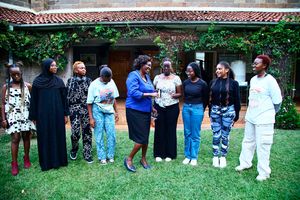John Njagi, the master of musical wars in Mt Kenya

Musician John Njagi.
Nobody in the Mt Kenya music scene fancied getting on the wrong side of veteran musician John Njagi for he hit back with raw, fury laden and demeaning tracks.
His tracks like Múgwí wa Útukú and Múndú útoí úngí are some of the examples where he freely ‘defames’ his opponent.
“Yes, the two songs were about a fellow Mt Kenya crooner who had crossed me one too many [times]...I had tried warning him to cease but he wouldn’t and I decided to belt it out for him to try and see if it was the only way he could be kept in check,” he told JK TV channel.
So mad was Njagi about the Murang’a musician that “just like the way a Moran throws a spear at the enemy while still stepping on an arrow, I had prepared a series of hit-back songs had he not made peace with me.”
He says he was ready to research on profane language to amass a lingual arsenal to burn the industry with revenge songs “but thank God we sat down, made peace and called our vocal soldiers back.”
Remorseful, Njagi now admits that he was wrong and urges other artistes to desist “from exposing to our fans our mental deficiencies through songs.”
He specifically cites the Múndú útoí úngí track, which he says was unnecessarily harsh, especially the stanza that states “in the Agíkúyú community a gossiper like you would be put in a beehive, tied with dry leaves, multitudes called to witness you being set ablaze; since your type is no better than a witch befitting death.”
To that, Njagi says, “I am sorry one more time,” adding that he had repented over his harsh songs. Musicians should only sing for the fans “but not against ourselves”, he adds.
And though he has apologised to his fans for the harsh songs and the musician he was hitting back at, he is yet to pull down the track from online platforms.
But Njagi further argues that unless artistes unite, they will never achieve sectoral reforms desperately required to maximise earnings.
“We are only good in lone ranger projects and programmes. We only sing and dance in individual corners. The unity of purpose is not there and it marks our undoing,” he says.
Famed for popular wedding and dowry function track Korwo níndakúí tene, Mr Njagi, who last week launched his 14th album in Ruiru's Ashaki gardens, says, “We are nowadays known more for fighting each other and leaking private moments to bloggers than in creating a united front to pursue the common good.”
The album carries his chart trending track Maitú Wanjiarire, living true to his love for songs about relationships.
He is well known for singing about love for girlfriends, wives, mothers, grandmothers and sex. In political seasons, he joins sides and belts out in favour of the side he is aligned with.
He says music has lots of money “but should you get into it without wisdom, the sector will burn you to irrelevancy.”
Mr Njagi adds that there are “anointed” musicians who are busy amassing wealth in the industry “and the fake uninspiring ones complaining of lack of fans and opportunities.”
“Just like the anointed preachers have their churches full, if God has not called you into music, don't venture into it for you will know nothing but misery. But if God has called you into it, you will encounter minimal problems and you shall prosper.”
***
Do you have feedback on this article? Please e-mail: [email protected]




